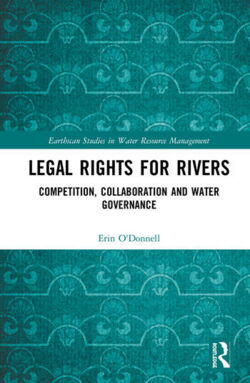Legal Rights for Rivers. Competition, Collaboration and Water Governance

By Erin O'Donnell, 2018
In 2017 four rivers in Aotearoa New Zealand, India, and Colombia were given the status of legal persons, and there was a recent attempt to extend these rights to the Colorado River in the USA. Understanding the implications of creating legal rights for rivers is an urgent challenge for both water resource management and environmental law. Giving rivers legal rights means the law can see rivers as legal persons, thus creating new legal rights which can then be enforced. When rivers are legally people, does that encourage collaboration and partnership between humans and rivers, or establish rivers as another competitor for scarce resources?
To assess what it means to give rivers legal rights and legal personality, this book examines the form and function of environmental water managers (EWMs). These organisations have legal personality, and have been active in water resource management for over two decades. EWMs operate by acquiring water rights from irrigators in rivers where there is insufficient water to maintain ecological health. EWMs can compete with farmers for access to water, but they can also strengthen collaboration between traditionally divergent users of the aquatic environment, such as environmentalists, recreational fishers, hunters, farmers, and hydropower. This book explores how EWMs use the opportunities created by giving nature legal rights, such as the ability to participate in markets, enter contracts, hold property, and enforce those rights in court. However, examination of the EWMs unearths a crucial and unexpected paradox: giving legal rights to nature may increase its legal power, but in doing so it can weaken community support for protecting the environment in the first place. The book develops a new conceptual framework to identify the multiple constructions of the environment in law, and how these constructions can interact to generate these unexpected outcomes. It explores EWMs in the USA and Australia as examples, and assesses the implications of creating legal rights for rivers for water governance. Lessons from the EWMs, as well as early lessons from the new ‘river persons,’ show how to use the law to improve river protection and how to begin to mitigate the problems of the paradox.
About Erin O'Donnell
Erin O'Donnell is a Senior Fellow and sessional lecturer at the University of Melbourne Law School, Australia. She is also an independent consultant on water markets to the World Bank and has worked on water governance in the public and private sectors for more than 15 years. More here
Order the book on Routledge
Book review by Roland Brunner, Blue Community Zurich
Recent publications by Erin O'Donnell:
- ‘Water courses and discourses: A media content analysis of environmental water reporting in Australia’ (2024) Environmental Science and Policy (open access)
- ‘Water sovereignty for Indigenous Peoples: Pathways to pluralist, legitimate and sustainable water laws in settler colonial states’ (2023) PLOS Water (open access)
- ‘Cultural Water and Indigenous Science’ (2023) Science 381(6658), 619-621
- ‘Ontological Collisions in the Northern Territory's Aboriginal Water Rights Policy’ (2023) Oceania 93(3) 259-281 (open access)
- ‘Repairing our relationship with rivers: water law and legal personhood’ (2023) Research Agenda for Water Law. Eds R Larson and V Casado Perez. Edward Elgar Publishing Ltd.
